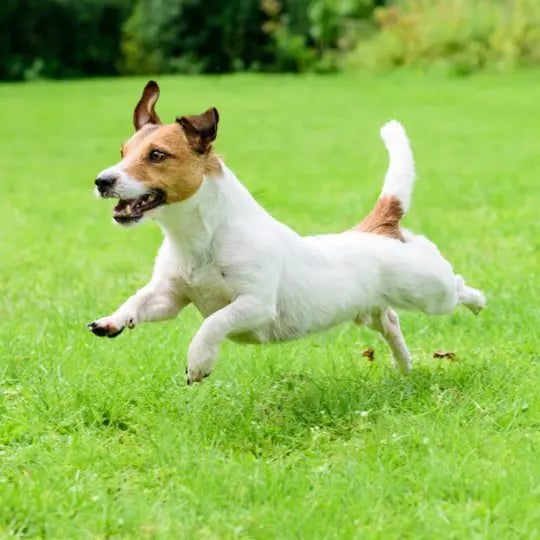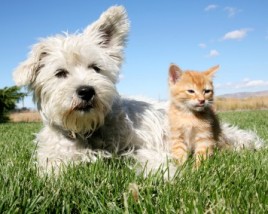Pet-Safe Lawn Care Tips

Updated April 2021
In your quest for a beautiful lawn, it’s often possible to forget about your four-legged friends. Some of the methods employed by homeowners can actually be detrimental to the health of your beloved pets. Learn what to do and what to avoid by reading on as we detail a few pet-safe lawn care tips.
Your Check List for Pet-Safe Lawn Care
Chemicals
Certain pesticides, insecticides, and herbicides are unsafe for animal consumption. Pets should be kept inside after application while the products dry and should be taken to the vet immediately in the instance that they do consume any of these materials. Clean the application area after applying lawn chemicals by sweeping away any granular residue and diluting any spilled product with water.
 Choose Pet-Safe Lawn Fertilizer and Mulch
Choose Pet-Safe Lawn Fertilizer and Mulch
Fertilizer and mulch can both be dangerous to your animals when consumed in large portions. Many pets find organic fertilizer to be delicious. Often filled with blood and bone meal and fish byproducts, organic fertilizers make a tasty snack for dogs but can wreak havoc on their digestive systems. Opt for pet-friendly products instead. When shopping for mulch, steer clear of the cocoa variety. This particular formula smells sweet and contains theobromine, the ingredient found in chocolate that is toxic to dogs.
Avoid and Remove Toxic Plants
Certain mushrooms and plant leaves can be poisonous when consumed by a pet. Avoid growing any of the following plants as they have been known to pose mild to extreme health risks for cats and/or dogs.
- Lilies
- Amaryllis
- Oleander
- Foxglove
- Lily of the valley
- Rhododendrons
- Azaleas
- Laurels
- Autumn crocuses
- Equipment and Machines
Equipment and Machines
Make sure that your animals are inside when you’re operating a leaf blower, lawnmower, or snowblower as these machines can spray exhaust, snow, and other debris at high speeds. Also, be mindful of how you’re storing your equipment. Those sharp blades can easily cut your pet if they get too curious and close.
Treat for Dangerous Pests
While spending time outside, your pet might run into some petite pests that can cause great harm. In Pennsylvania, Delaware, and New Jersey, common foes for house pets include ticks and mosquitoes.
 Ticks are small and stealthy and often go unnoticed until it is too late. While they do not jump or fly, their natural environment allows them the perfect access to their prey. They drop from trees or hide in the grass waiting for a host (like your pet) to feed on. Ticks are considered to be superior carriers of Lyme disease, which can cause serious health problems for both humans and pets.
Ticks are small and stealthy and often go unnoticed until it is too late. While they do not jump or fly, their natural environment allows them the perfect access to their prey. They drop from trees or hide in the grass waiting for a host (like your pet) to feed on. Ticks are considered to be superior carriers of Lyme disease, which can cause serious health problems for both humans and pets.- Heartworm is a serious condition caused by mosquitoes. The Aedes, Anopheles, and Mansonia species of mosquito are found in the northeast and are all capable of transmitting heartworm.
Check Tree Limbs
While trying to make a safe environment in your yard, you might spend a lot of time looking down at the ground. Be sure to look up, too. Unsturdy limbs can fall down, severely injuring your pet if he is caught at the wrong place at the wrong time.
For Pet-Safe Lawn Care, Call Green Lawn Fertilizing
As lawn care professionals and pet lovers, we’ve got some ideas on how to make your lawn look great without sacrificing your pet’s safety. Give Green Lawn Fertilizing a call at 855-469-0692 today to learn about our Green Lawn Program and more.